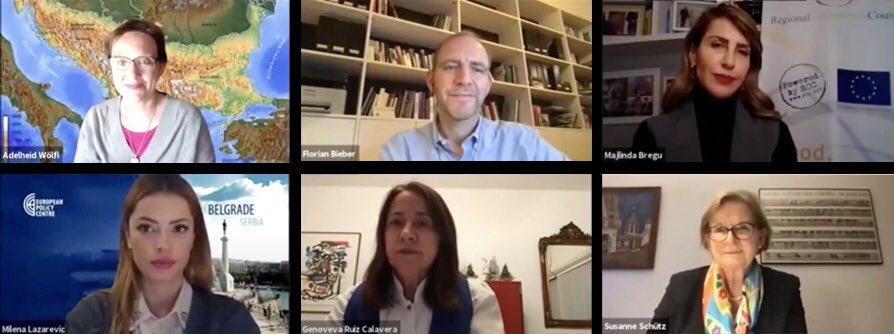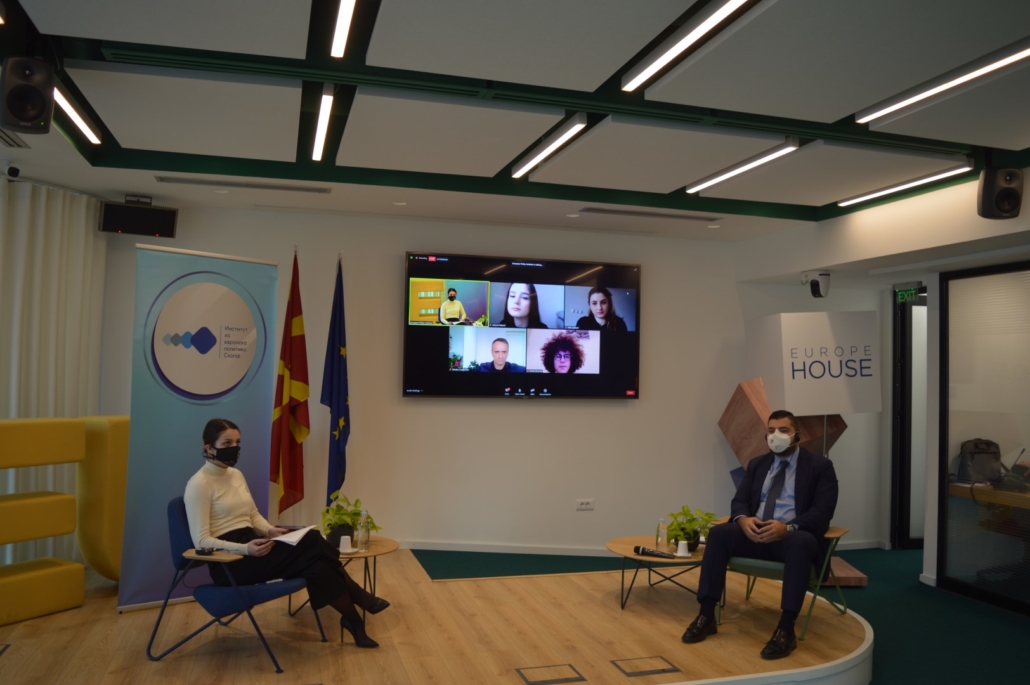Freedom of expression online: In between regulations and chaos
14 December 2020. – Freedom of expression online should have some limitations and regulations; this was the main takeaway from the today’s public debate: Freedom of expression in the internet: a common challenge for the EU and Kosovo. Organized by Group for Legal and Political Studies (GLPS).
The panel consisted of Eraldin Fazliu, Editor in chief, Prishtina Insight, Erblin Hoxha, civil society activist and Executive Director at Debate Center, Njomza Arifi – Programme Manager at Group for Legal and Political Studies as well as Ema Pula, project coordinator at GLPS, and facilitator of the first local citizen consultation online with the youth, organized under Europe for Citizens project.
Ema Pula presented the conclusions and recommendations from the consultations with youth that GLPS held two weeks ago, and where 17 young people of age 18-24 from all across Kosovo participated in the event.
She presented the main findings of the consultations where her peers defined some of the most positive and negative aspects of the internet. Among positive aspects were the use of the internet as an interactive/communicative space, the internet as a source of information, and lastly the use of the internet for financial benefits. On the other hand, few negative aspects were: the presence of fake news, online bullying, and the violation of privacy. Ema stated that in order to protect the positives and fight against the negatives, enforcement of applicable laws and sanctions should be stricter. Lastly, awareness raising campaigns should be continuous and would boost the level of media literacy.
Furthermore, Eraldin Fazliu, editor in chief in Prishtina Insight appreciated and agreed with the conclusions of the youth. He said that the fake news, misinformation and the lack of regulations of the freedom of expression is contributing to the rise of the hate-speech and polarized, not only among citizens, but also among journalists. Fazliu, posited the risk of hyper use of social media and how that is affecting the society as a whole.
With almost 90% of all people generations gravitate on the internet, and the information they gather, the virtual groups they belong, often it gives the impression that these people are being served by their simple truths – and that is a big problem.
Another problem according to Fazliu is the selective justice when dealing with the cases of misinformation, fake news, or online threats towards people. While the response was more accurate when politicians were threatened on the internet, the same it cannot be said for regular citizens or journalist. However, standards and regulations to regulate the freedom of speech on the internet and not limit it is the solution that Fazliu sees as feasible.
Erblin Hoxha, who has worked with the youth for many years now, stated that “Research shows that the youth used to take 10-15 seconds to look at a news article, but now they spend 2-3 seconds to read the news, therefore headlines are what attracts them.” This demonstrates that the youth is living in different realities, and being served by the internet algorithms, arguably the perspectives offered in the virtual space it hinders the critical thinking and decent information. Therefore, Hoxha posed a serious question – “What do we do with the media that purposefully creates fake news?” He proposed that the online sphere should be regulated in the same way in which other media spheres are regulated.
Njomza Arifi, from GLPS depicted both sides of the internet and its impact in society.
“Many social media users have recently spread false news, propaganda and to some extent hatred on social media, knowing that there is little or no control over social media in Kosovo. Fake news in Kosovo has often harmed public figures but has also wrongly shaped public opinion. However, hate speech, xenophobia and others have been fueled by the misuse of freedom of expression on the Internet. However, in Kosovo, freedom of expression on the Internet has had a positive impact on civic mobilizations, online petitions, and the organization of protests and increased civic advocacy. There are many cases when online socio-political activism has been translated with result in practice.”
This event is part of the project Make Future Together: EU and the Western Balkans from the Youth Perspective, implemented by a network of think tanks from 6 countries in the region (Think for Europe Network – TEN) together with International Affairs Institute in Rome, Bronislaw Geremek Foundation in Warsaw and European Policy Centre (EPC) in Brussels. The project is funded by the Education, Audiovisual and Culture Executive Agency (EACEA) through the Europe for Citizens program.


